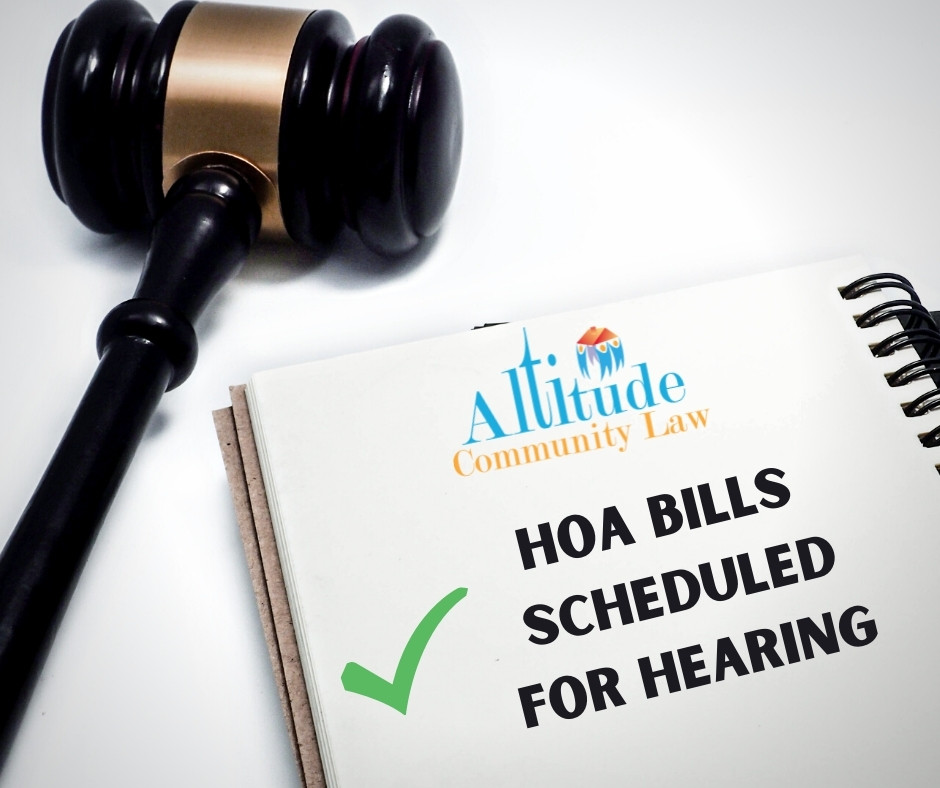
Three of the bills aimed at common interest communities are all scheduled to be heard on March 9, 2022, in the afternoon session of the House Committee on Transportation and Local Government. The three bills are HB22-1239, which is the regulation of community association managers and, more appropriately, the regulation of community association management companies. Next is HB22-1137, which purports to be the Homeowners’ Association Board Accountability and Transparency Bill but has very little to do with either of those topics. Last is HB22-1139, which purports to prohibit a homeowner association from regulating the use of public rights of way.
While the Community Associations Institute opposes all three of these bills, HB22-1137 is of particular concern and could create a situation in which an association would be unable to operate. Of the many issues with the bill, the following are the most glaring:
1.Section 2 of the bill requires that before sending someone to collections, the Association (or management company) has tried to contact the owner in at least two of the following ways IN ADDITION TO THE ALREADY REQUIRED PAYMENT PLAN OFFER LETTER:
- First class or certified mail; it is not clear if this constitutes one or two possible ways. The Association is already required to do the first.
- Email, if the Association has an email.
- Telephone call or voicemail message (which are not always provided).
- In person contact, putting a Board member or Manager at risk of an angry owner.
Given the above, an owner simply need not provide an email or phone number, neither of which are required, and not open their door, and the owner would all but be immune from paying assessments.
2. Additionally, HB22-1137:
- Requires a majority of the Board to vote on referring the owner to collections in a recorded vote at a public meeting. This cannot be delegated to management companies, similar to the current foreclosure rules. This however, puts the Board in the unfortunate situation of needing to identify unit number and amount delinquent to all owners attending a meeting. This has never been recommended and acts more as a public shaming for not paying assessments to be aired to all owners.
- Limits late fees, fines and interest to $50 a day or $500 total. This means all an owner need do is avoid collections for a while and the Association is robbed of the time value of money. Additionally, for associations with higher assessments, these limits may encourage nonpayment of assessments.
- Limits interest to 8% a year which, again, would rob an association of the needed cash flow to operate the community.
- Prevents any fees for providing the owner a ledger, which ignores the fact that additional labor goes into providing delinquent ledgers.
- Requires the Association provide the names, addresses and contact information for one or more foreclosure counseling services available in the county where the Association is located even if foreclosure is not being discussed.
3. The Association is required to inform delinquent owners about the available resources upon request of the owner, including:
- Contact info for any available financial counseling services,
- legal aid services,
- translation services,
- mental and behavioral health services,
- services for senior populations, and veterans’ services.
No assistance or guidance is provided to the Association for accomplishing the above, adding an additional burden to the Board, which for a self-managed community may be very problematic.
4. HB 22-1137 also prevents foreclosure unless:
- The Association has made a written offer of a payment plan, but the monthly payments toward the arrears cannot exceed 10% of the current monthly assessment. In calculating this out, as an association may not foreclose unless the delinquency is at least the equivalent of 6 months common expenses in arrears with the minimum payment plan term, is 6 x 10 = 60 months. That’s five years minimum, and the actual balance is usually significantly larger than just the six months. This will have a material impact on association budgets and performance of work in the community. With the tragedy in Florida and the response from FHA concerning deferred maintenance, now is not the time to make it harder to collect assessments. This will put an unwarranted strain on the remainder of the community.
- Within 30 days after the payment plan offer has been made, the owner has either declined the payment plan or accepts it and failed to pay at least three monthly installments within 15 days after they were due. We are not sure how one owner can miss three payments at least 15 days apart within 30 days?
- The bill does not address what happens if the owner ignores the offer. Does that mean we can assume they declined it? Do we have to wait for them to miss three payments before we can assume that?
The bottom line is this bill is not workable and puts an unreasonable strain on the Association’s paying members and will require a Board to consider a cost benefit analysis of whether to send an owner to collections and/or enforce its covenants, both of which a board is required to do. This will put the Board and the Association in a no-win situation. We encourage you to contact your representative and strongly oppose HB 22-1137. You can find your particular legislator here.
As always, please do not hesitate to contact an Altitude attorney at [email protected] or (303) 432-9999. And stay tuned to our Legislative Tracker for more updates on 2022 Legislation.